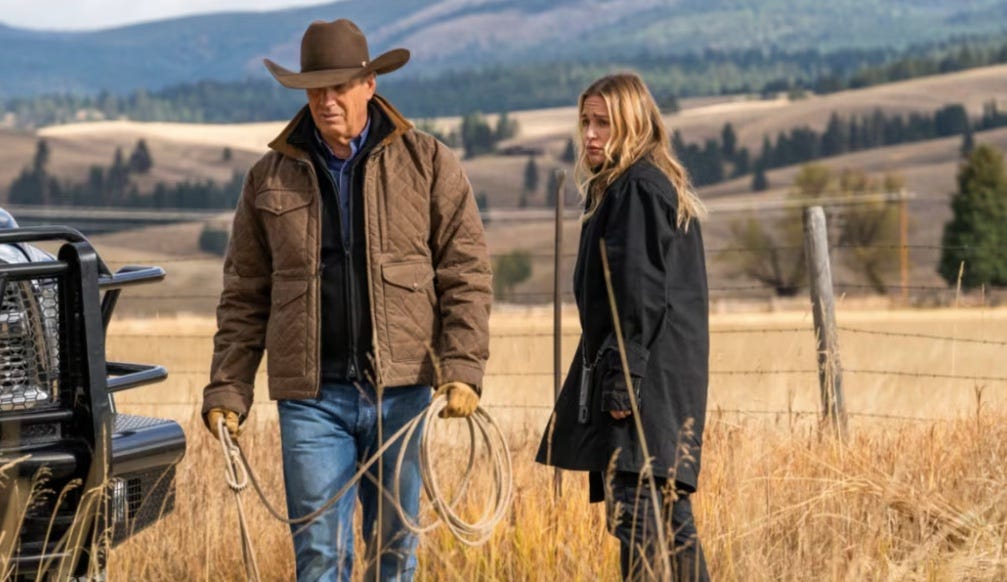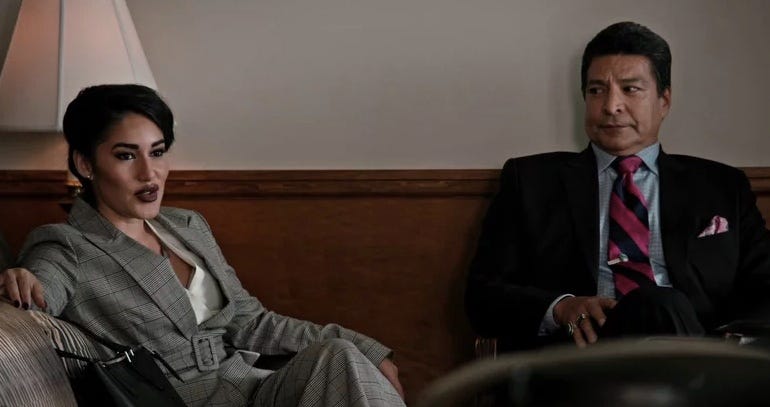Rabbit Hole: Coastal Elites Despise "Yellowstone" Because the Good Guys are Bad and Bad Guys are Good
Unpacking the cultural phenomenon... that exists, and that doesn't
“Rabbit Hole” is a single-topic deep dive column that comes out twice per month for paid subscribers. The free newsletter returns Sunday.
“Yellowstone” premiered close to five years ago, and fairly quickly became a massive hit. The first episode of season five, back in November, saw more than 12 million viewers — an enormous number that would make it a hit in any television era, but especially now, where the only programs that reach that height these days are sports and the occasional awards show (Sunday night’s Oscars brought in close to 19 million).
And yet — Yellowstone barely gets any coverage by the entertainment media and broader corporate press. Why is that? I had no idea, until my wife and I started watching the show from the beginning a few months ago. Now we’re all caught up — and anticipating the fifth season resuming sometime later this year (assuming the Kevin Costner drama gets resolved).
At first, the relative silence about the show didn’t make sense to me. It’s soapy and fun — “Dallas” meets “The Sopranos.” It’s incredibly well-made — gorgeously shot on location, with excellent acting and writing (particularly from Kelly Reilly, as Beth Dutton, and of course Costner as John Dutton). It’s not your traditional “Republican” show either — one that the Family Research Council would approve of. There’s sex and nudity, and the f-bombs are plentiful.
But over the course of the last few months I’ve dug into the question, and what makes Yellowstone so unappealing to our coastal elites who have a monopoly on the cultural conversation is deeper, and more subtle. In short, and in the most non-nuanced way possible — the good guys are the bad guys and the bad guys are the good guys.
It’s not just that the main characters at the center of the story are the anti-heroes — because of course there’s Tony Soprano, and Walter White, and many others before it. The “good guys” are often bad, when it comes to prestige drama. But when we look at the ancillary characters — or, more importantly, the vibe, it’s a total inversion compared to the typical prestige TV show of today.
Let’s take our lead character John Dutton’s love interest in season four and five, Summer Higgins. The extreme environmentalist is almost a parody of the left-wing progressive Greta Thunberg-type. In a different, more mainstream show, she’d be at a bare minimum principled and smart — in Yellowstone, she’s a joke. She’s easily intellectually disarmed and overrun by the Montana locals. “How cute does an animal have to be before you care if it dies to feed you?” she’s asked when it becomes clear her version of protecting wildlife only extends so far.
But Summer’s relationship with John Dutton itself is indicative of how Yellowstone treats her principles — they only go so far. Because let’s be honest, Dutton, played by Costner, is everything the progressive left hates and rails against. From an early speech when he declared his candidacy for governor: “There is a war being waged against our way of life. That is progress in today’s world. If it’s progress you want, then don’t vote for me. I am the opposite of progress. I am the wall it bashes against. And I will not be the one who breaks.”
Being the “opposite of progress” brings to mind another, more complicated, character, and element, of Yellowstone. It echoes almost identically the comments of Thomas Rainwater, the head of the Indian reservation near Yellowstone, who has served as sometimes antagonist, sometimes cautious ally to Dutton. In season one, Rainwater told Dutton, “I'm the opposite of progress. I am the past, catching up with you.”
For Rainwater, like Dutton, progress is not inevitable, but incremental. Those who demand sweeping change are evil, or stupid. It’s the rejection of the ethos of today’s modern cultural norms.
Rainwater ultimately comes face-to-face with the consequences of his “opposite of progress” positions through Angela Blue Thunder, a young, beautiful, progressive Native American lawyer who wants sweeping change rather than strategic, slow-moving action.
In a typical culturally “acceptable” prestige show of today, Blue Thunder would be a protagonist, or at least someone who could be looked at enviably. In Yellowstone, she’s evil — trying to undermine the work that the slow-but-steady Rainwater is undertaking.
This is echoed in the involvement of the Market Equities foes to the Dutton family. Caroline Warner and her acolytes are set up as the cosmopolitan antagonists to the Montana natives, flown in from the big city. They want an airport, and developments, and casinos. They bring up the dirty “T” word — tourism. Ultimately, they are easily defeated, or at least manipulated, through their ignorance. They would be evil, if they weren’t so dumb and useless.
In a different show, the Duttons would be portrayed as anti-diversity. They’d be racists, and bigots, and homophobes. Instead, in Yellowstone, there’s diversity, but it exists not to check a box or to tout as a means of establishing liberal credentials, but as simply a reality. There’s Teeter, a female cowboy who has earned her bonafides and become one of the guys, even getting the Yellowstone brand. Meanwhile, she’s in a relationship with Colby, a Black cowboy whose race has absolutely nothing to do with anything on the show. It’s just a fact.
And then there’s that gay kiss.
In season five, Dutton’s press advisor Clara becomes a central character, as a fish out of water. As the first part of the season comes to a close, we see her kissing an unknown female character at a county fair. “My press advisor's behind me, making out,” says Dutton, nonchalantly.
In a different show, the alpha cowboy would be against this LGBT display of affection. Or, perhaps, his journey toward acceptance would be viewed as a milestone, played out over several episodes. Instead, it’s a throwaway line, and a throwaway moment. (And, it’s worth noting, that’s actually how it was in the reality of the show behind-the-scenes — the actress who plays Clara was supposed to make out with someone, male or female, and she suggested it be her female partner who was on set with her. Gay, straight, no biggie.)
We could dig into the way marriage is portrayed on the show — like with Beth and Rip. It’s something that elevates all involved. How Beth herself is the inverse of the misogyny trope that could easily be inserted into a show about masculinity in the mountains. She’s the most alpha person in the entire series. She quite literally runs the show.
Which brings me to my favorite moment on the show, from seasons two, episode 9, “Enemies By Monday.” It involves Beth, not a “good” character by any characterization, and the most truly “good” person in the series, Monica, her Native American sister-in-law.
Here’s a short clip, but you really need to watch the full episode (and of course, the full series):
Beth comes to her rescue, and you could see the way the scene could slip into one involving “bad rich white lady” territory. But Monica spares the racist shop owner. She grants her clemency. And then, as the series goes on, Monica learns to love and respect the Dutton family. She becomes one of them — because she recognizes their inherent goodness.
‘We don’t hate you. You just hate us,’ the show tells the coastal elite snobs. ‘And most importantly, you don’t understand us — and have no interest in remedying that apathy.’
The coastal liberal elite operate under an air of open-mindedness. But instead, they’ve proven to be the provincial, narrow-minded scolds they conceivably critique. All that education has amounted to a narrowing of the worldview, rather than an opening.
The good guys in Yellowstone are curious about what they don’t understand. They’re excited and invigorated about the unknown. The coastal elites parodied on the show hate and resent the unknown.
This nuance is something both sides don’t necessarily comprehend. “Kevin Costner's repellent Western series reeks of Trumpism,” says one annoying headline from a few years ago. Yellowstone is “conservative white grievance without any of the negative baggage," says Sam Sanders in Vulture.
At the same time, Matt Walsh of The Daily Wire tweets, “Every Taylor Sheridan show is overtly woke. I have no idea why conservatives like this guy so much. He hates you and is trying to make shows that you won't like. He has literally said so.”
No. Sheridan at one point in 2017 talked about wanting to impeach Trump. And in The Atlantic, Sheridan talked about how it wasn’t overtly political, and instead was “talking about the displacement of Native Americans and the way Native American women were treated and about corporate greed and the gentrification of the West, and land-grabbing.” (Spoiler alert - that’s not “woke” by any definition.)
The truth is, there has been so little thoughtful ink spilled considering the success of Yellowstone. (A rare exception was this fun interview with the author Joyce Carol Oates in The Spectator about why she loves Yellowstone, and she says she’s the only person she knows who watches it, and who described it as “a simplified version of the divisiveness of the US at the present time, a microcosm of what is at stake for the future.”)
It’s unfortunate. Because while “Make Montana Great Again” or “Keep Montana Great” could easily be the slogans of the show, what is most impressive about the series is how it eschews the moral grandstanding of so much prestige TV with every twist and turn. It embraces an alternative cultural perspective, in a time when our cultural perspectives are increasingly fickle.
As John Dutton said in one of his most memorable quotes, “You build something worth having, someone’s gonna try to take it.”
Why does Yellowstone sit so uncomfortably with our coastal elites? The cultural supremacy they’ve built is being meticulously dissected by a smarter, more relatable show. And when it takes the cultural conversation away from the conventional, coastal consensus, it can feel a little like war.






You hit on something I've seen, also. I've seen conservatives blast the show for being woke and progressives blast it for being the opposite. They must be doing something right. I enjoy the show and am anxious for the next season. The show is a Western thriller and a soap opera all rolled into one, and the brawl between Beth and Summer was one of my favorite scenes. Total opposites beat the hell out of each other and come out being a little more respectful of each other. There have been a number of characters who have evolved over the seasons in their thoughts and actions, showing more understanding of those they thought only of as enemies. People would be better off if they'd just enjoy the show for its entertainment value and not weigh it against their political preferences. I also think the two offshoots of the show, 1883 and 1923, are lacking in comparison. 1883 makes huge, abrubt changes in the story line in order to make social statements and 1923, though well acted, drags horribly in getting on with its story.